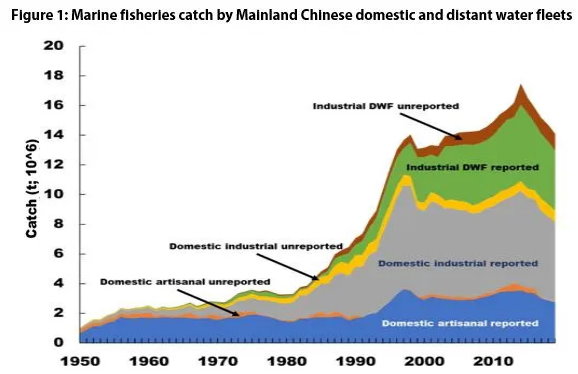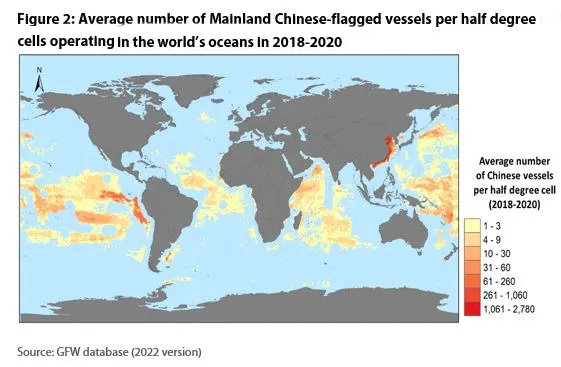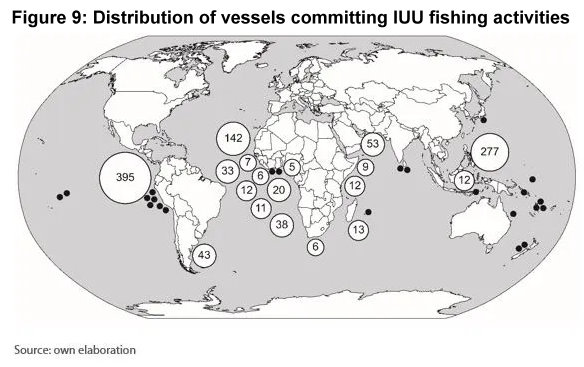 China not only has the largest fishing fleet in the world, but with 1.4 billion people is also a huge market of people who like to eat fish and seafood. Europe as the foremost import market of such commodities clearly has an interest to develop its relations with China in ways that respect the interests of both sides. The Fisheries Committee of the European Parliament gathered to discuss the role of China in global fisheries in its session on Wednesday 25 January 2023.
China not only has the largest fishing fleet in the world, but with 1.4 billion people is also a huge market of people who like to eat fish and seafood. Europe as the foremost import market of such commodities clearly has an interest to develop its relations with China in ways that respect the interests of both sides. The Fisheries Committee of the European Parliament gathered to discuss the role of China in global fisheries in its session on Wednesday 25 January 2023.
To put the debate on a sound footing, a team of scientists under the lead of Prof. Daniel Pauly and Dr. Maria Lourdes (Deng) Palomares of the University of British Columbia, Vancouver, Canada, had been commissioned to produce a study on the topic and present the key results to Committee members.

Source: Based on data reported by Mainland China to the FAO, with adjustments for IUU catches from Pauly et al. (2014), Pauly and Le Manach (2015) and Tsui et al. (2020)
Here we cite from the executive summary of the report:
“There is a large discrepancy and uncertainty in the number of vessels of the Chinese distant water fleets (DWFs). The low estimate of ‘visible’ vessels is around 900; a higher estimate assumes that about 2000 ‘invisible’ vessels must be added. However, the discrepancy may be that the larger number includes vessels operating in waters close to China, e.g., in Korea.
Although the overwhelming majority of mariculture production along China’s coastlines consists of bivalves such as clams, mussels and oysters, which require no feed, the smaller tonnage of marine fish that are farmed, i.e., about 2 mt per year, generate a demand for feeds which has made China the world’s major importer of fishmeal. This is becoming a problem in some West African countries, e.g., in Senegal, where the small fish that were consumed by people are now diverted to fishmeal factories and exported to China.
The overall situation of the Chinese fish and seafood sector is, from an international trade perspective, one of transition. This transition is from a leading processor of fish raw material for re-export as primary products (fillet) increasingly towards one of sourcing aquatic products – many of them prime items and some processed – for domestic consumption. The other key trend is the steady replacement of primary by secondary processed products in the Chinese export offer.”
 The researchers resisted the temptation to make China responsible for most of the ills in ocean governance as well as likely exaggerated estimates of its long distance fleet. They also noted that contrary to Europe with its large discrepancy between declared and effective marine protected areas (MPAs) China was fulfilling the Aichi objective of fully protecting 10% of its coastal waters. However, they did point to a lack of transparency in terms of its fishing agreements contrary to European practice. They noted that while China’s scientific publication numbers overtook those of any other country, quantifying what was going on in its production and processing sectors remained understudied and largely unpublished.
The researchers resisted the temptation to make China responsible for most of the ills in ocean governance as well as likely exaggerated estimates of its long distance fleet. They also noted that contrary to Europe with its large discrepancy between declared and effective marine protected areas (MPAs) China was fulfilling the Aichi objective of fully protecting 10% of its coastal waters. However, they did point to a lack of transparency in terms of its fishing agreements contrary to European practice. They noted that while China’s scientific publication numbers overtook those of any other country, quantifying what was going on in its production and processing sectors remained understudied and largely unpublished.
 The authors of the report also drew the attention of Committee members to the difficulties of getting to the bottom of beneficial ownership of illicit operations, particularly illegal, unrecorded and unregulated fisheries, as well as labour abuse. They intimated that the necessary further development of cooperation with China through government channels would not be enough to cast light into these often criminal practices. Instead the European Commissioni should fund civil society organisations to carry out the necessary tedious investigative work. They also recommended to apply existing rules evenhandedly in the relations to all countries. If Thailand had received a yellow card and upon this reformed its practices in the fisheries sector and if China was found to fall short e.g. with respect to product contamination, or something that warranted a yellow card, then it would help China to clear up its act.
The authors of the report also drew the attention of Committee members to the difficulties of getting to the bottom of beneficial ownership of illicit operations, particularly illegal, unrecorded and unregulated fisheries, as well as labour abuse. They intimated that the necessary further development of cooperation with China through government channels would not be enough to cast light into these often criminal practices. Instead the European Commissioni should fund civil society organisations to carry out the necessary tedious investigative work. They also recommended to apply existing rules evenhandedly in the relations to all countries. If Thailand had received a yellow card and upon this reformed its practices in the fisheries sector and if China was found to fall short e.g. with respect to product contamination, or something that warranted a yellow card, then it would help China to clear up its act.
The researchers strongly advised not to fall into the trap of hoping China might somehow go away and disappear from the international stage where it had appeared with a bang in the early 1980s when it was not being invaded like a century ago or busy with itself. China was huge and there to stay, so better accept the idea to deal with it properly and fairly.
The English summary version of the report is available by clicking on the link.
